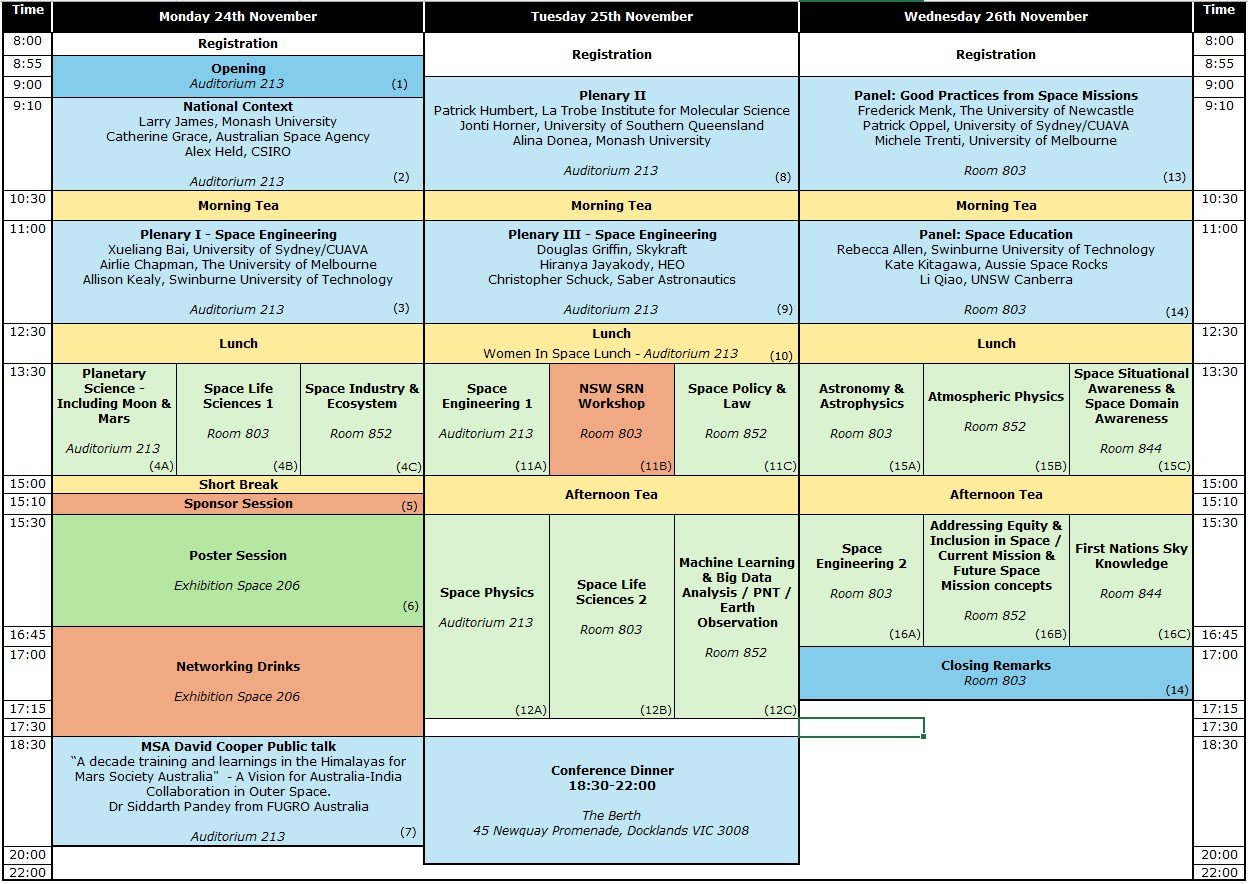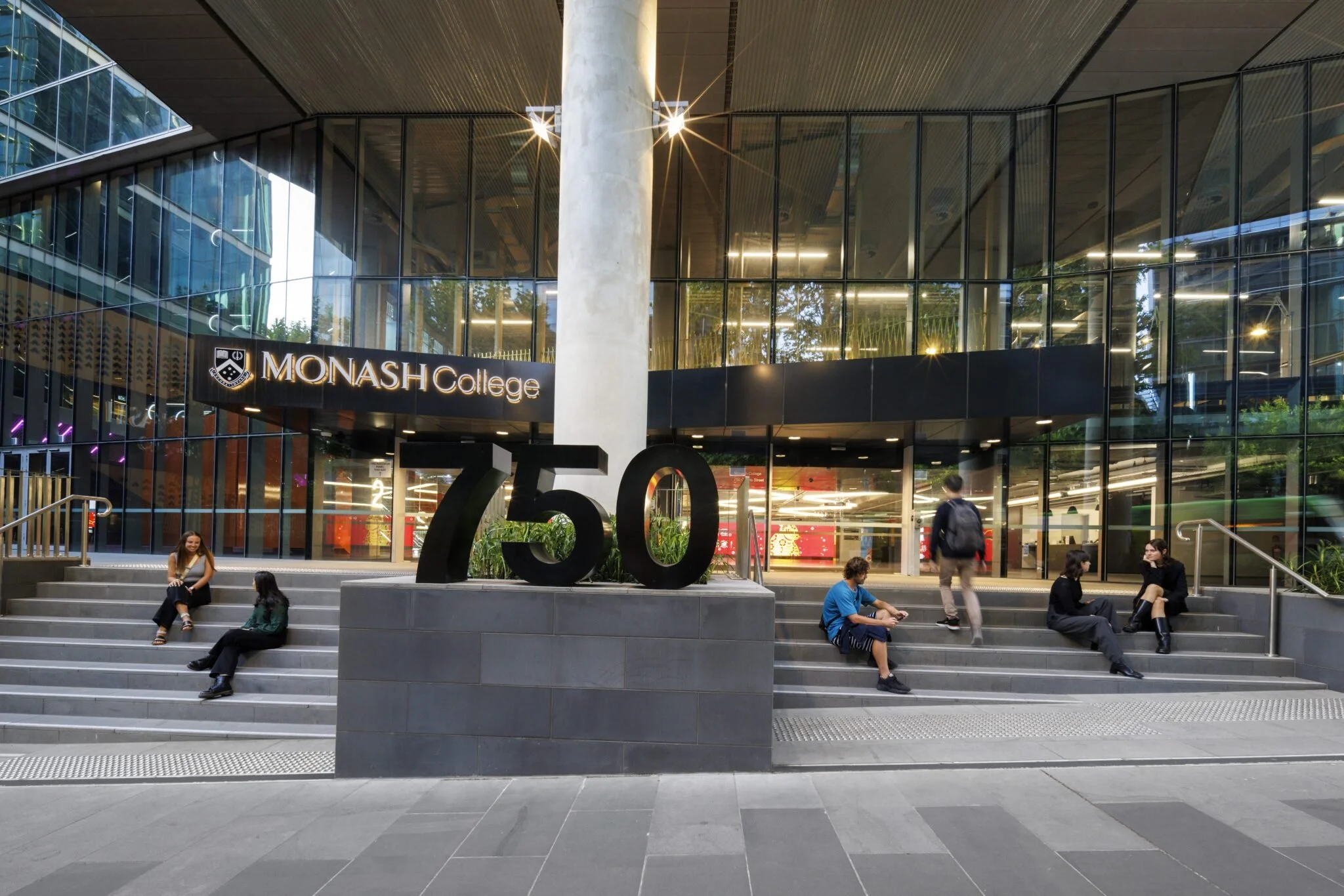
Australian Space Research Conference
Broaden Our Horizons: Melbourne, November 24-26, 2025
About the Conference
ASRC2024
The 24th Australian Space Research Conference (ASRC) was held in Melbourne at Monash College (750 Collins St) over November 24 to 26, 2025. It was a 3 day conference.
This conference was organised by the National Space Society of Australia, Mars Society Australia, and members of the Australian space research community with a heritage of organising 16 successful ASRC meetings to date.
The ASRC is the primary annual meeting for Australian space research. It welcomes researchers, engineers, educators, business and policy, and other workers from across the university, industry and government parts of the space sector, and is not limited to Australian-based research. International participants are most welcome.
Student prizes were awarded to the most outstanding oral presentations in several categories (e.g. HDR, UG). Winners are announced and presented with their prize at the end of the conference.
A female Researcher award was also presented to recognise professional achievement in space science and promotion of STEM diversity and inclusion.
Following the conference, attendees had the option to submit papers on their presentations for the peer-reviewed proceedings of the meeting. Those proceedings will be published with an ISBN. Previous proceedings may be located at URL: https://www.nssa.com.au/asrc-proceedings
Abstracts Opening: 5 August 2025
Abstracts Close: 19 September 2025
Registrations Open: 22 September 2025
Draft Program Release: 20 October 2025
Early-bird Registrations close: 27 October 2025
Conference Start: 24 November 2025
Conference Dinner: 25 November 2025
Conference End: 26 November 2025
Conference written papers due: 10 December 2025
Explore the diverse range of topics our conference covers
-
Delve into the universe's mysteries through topics like space and atmospheric physics, Earth observation and remote sensing, planetary sciences, astrobiology, and space-based astronomy and astrophysics.
-
Explore how space affects living organisms, from understanding the complexities of human habitability in space to the study of life sciences in extraterrestrial environments.
-
Discover the technological backbone of space exploration, encompassing communications, navigation, space operations, propulsion, and spacecraft design, testing, and operation.
-
Learn about the commercial and economic aspects of space exploration, from space-based industries to the business strategies propelling space ventures.
-
Unearth the past and indigenous perspectives on space with a focus on space archaeology and archaeoastronomy, the study of ancient, indigenous astronomical knowledge.
-
Stay informed about the ever-evolving space environment, including space weather and the tracking and prediction of natural and artificial objects in space.
-
Get to know both current and future Australian space initiatives that aim to push the boundaries of our understanding and capabilities in space.
-
Delve into the legal and international aspects of space exploration, including international relations, space policy, and law.
-
Understand the educational efforts and workforce development initiatives essential for growing and maintaining a thriving space sector.
The conference currently has the following confirmed plenary/invited speakers:
- Professor Larry James – Monash University / SmartSat CRC,
- Dr Alex Held – CSIRO,
- Dr Xueliang Bai - University of Sydney,
- A/Professor Airlie Chapman – University of Melbourne,
- Dr Alina Donea – Monash University,
- Dr Douglas Griffin – Skykraft,
- Professor Jonathan Horner - University of Southern Queensland,
- Professor Patrick Humbert – La Trobe University,
- Professor Allison Kealy - Swinburne University,
- Dr Hiranya Jayakody - Heo Robotics,
- Mr Christopher Schuck - Saber Astronautics
Registrations

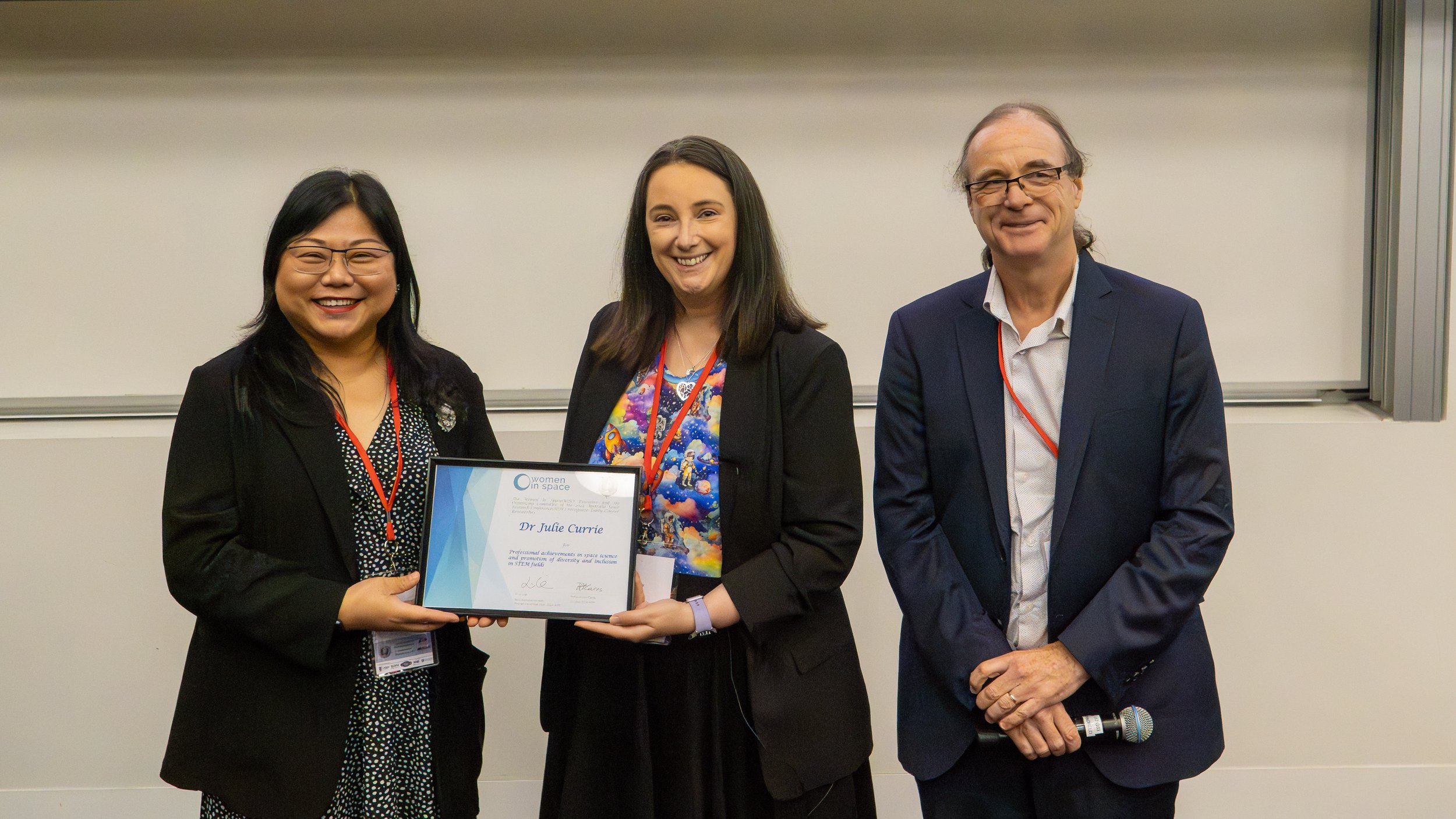
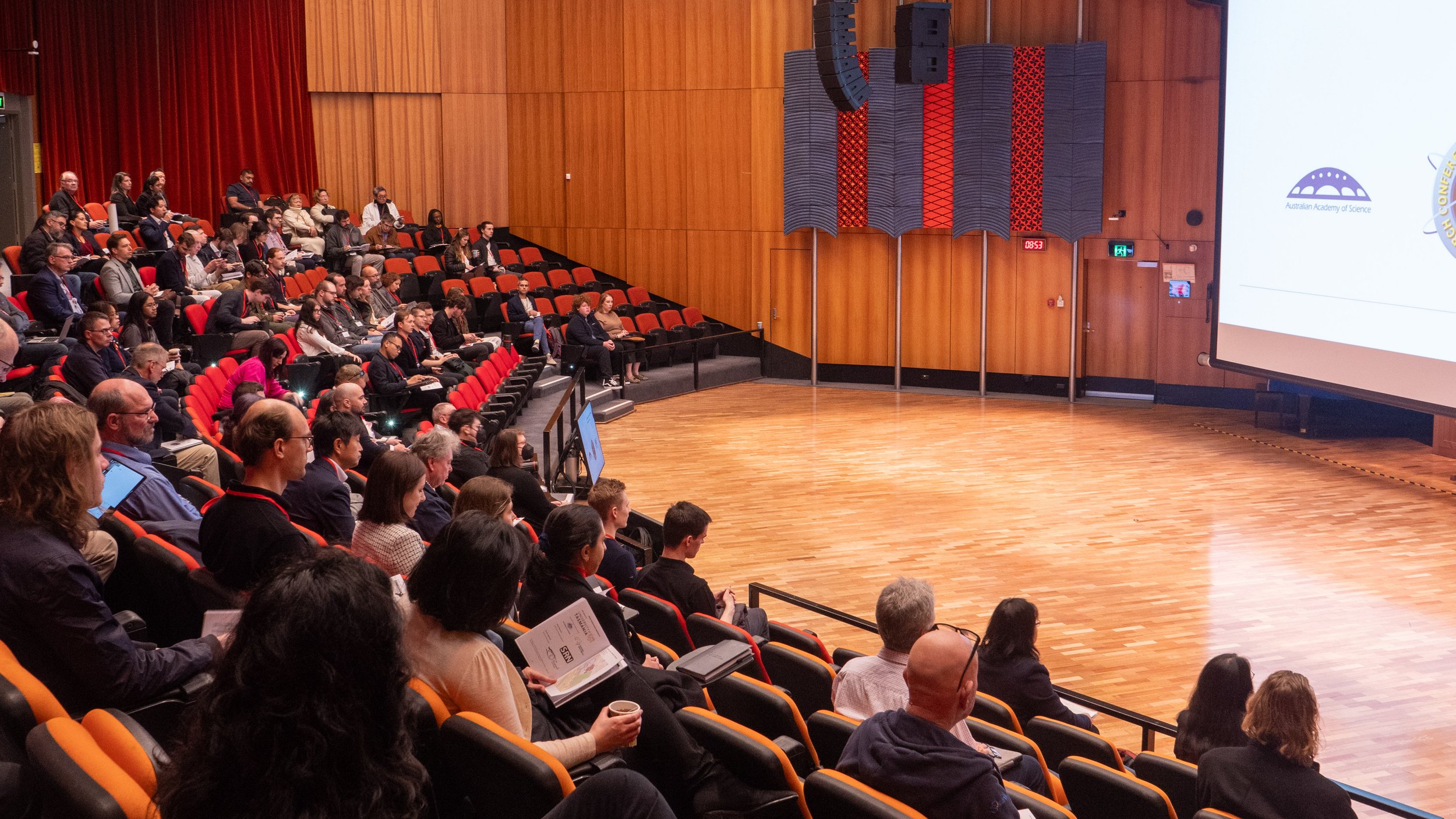
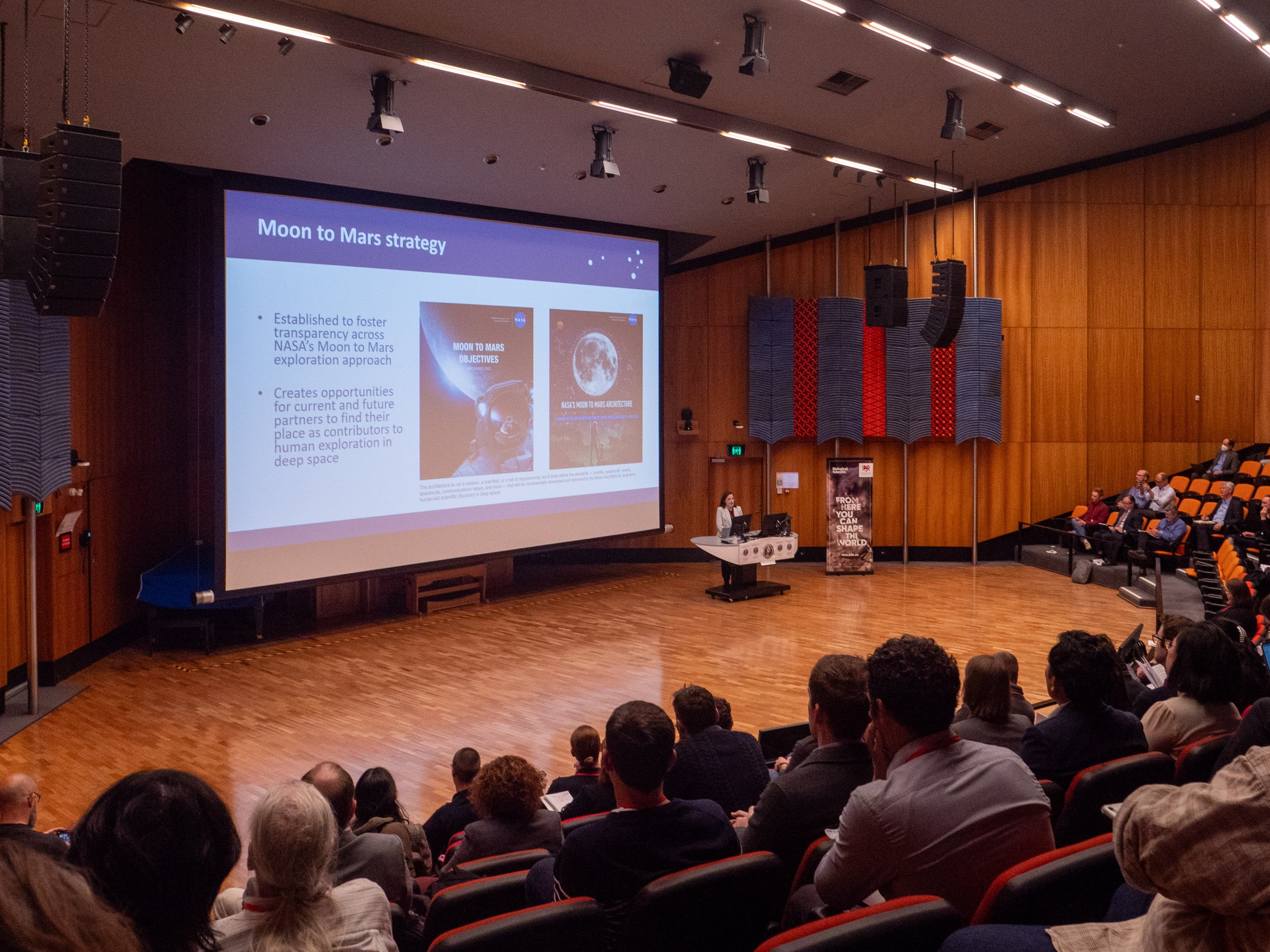

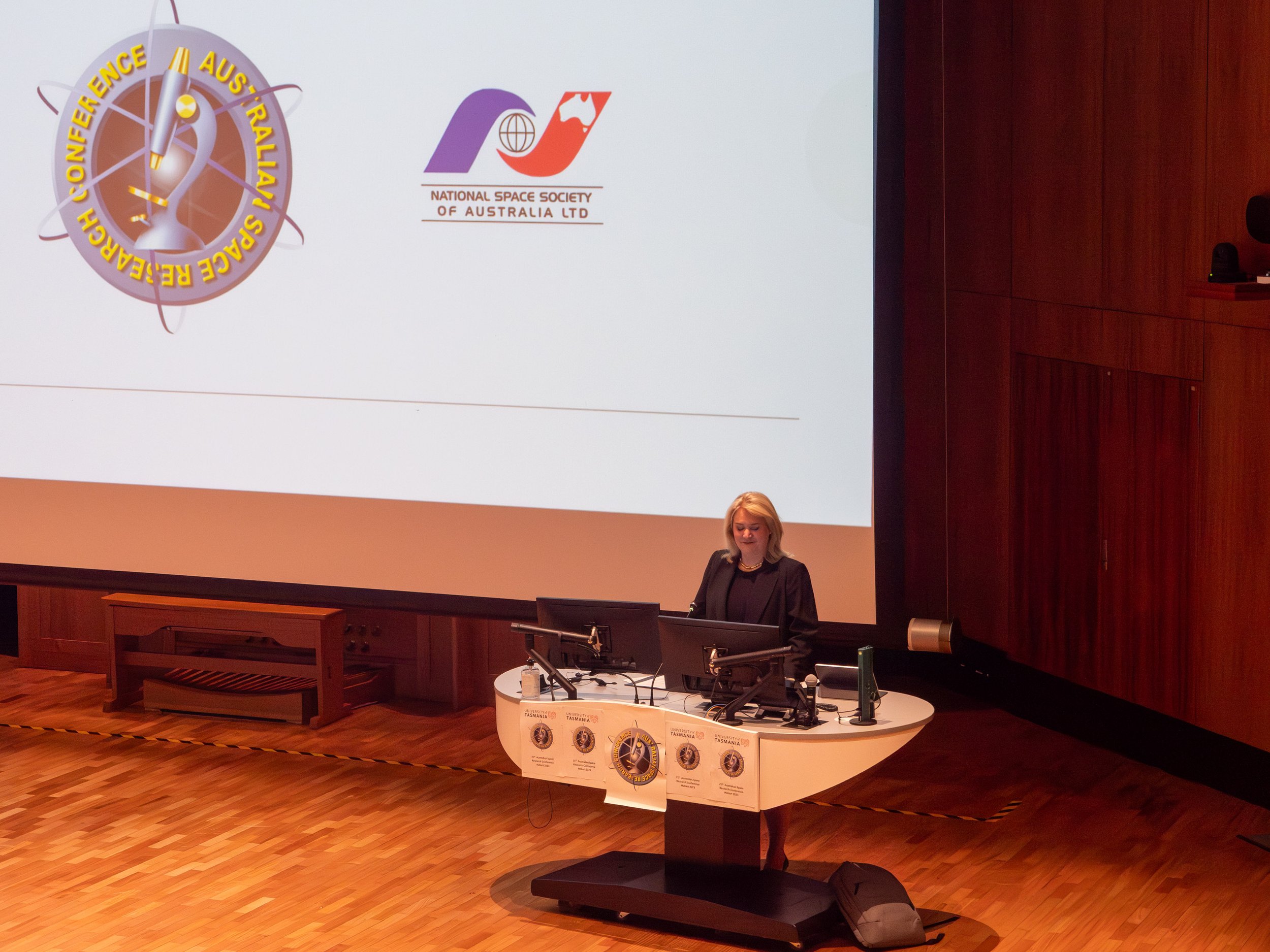
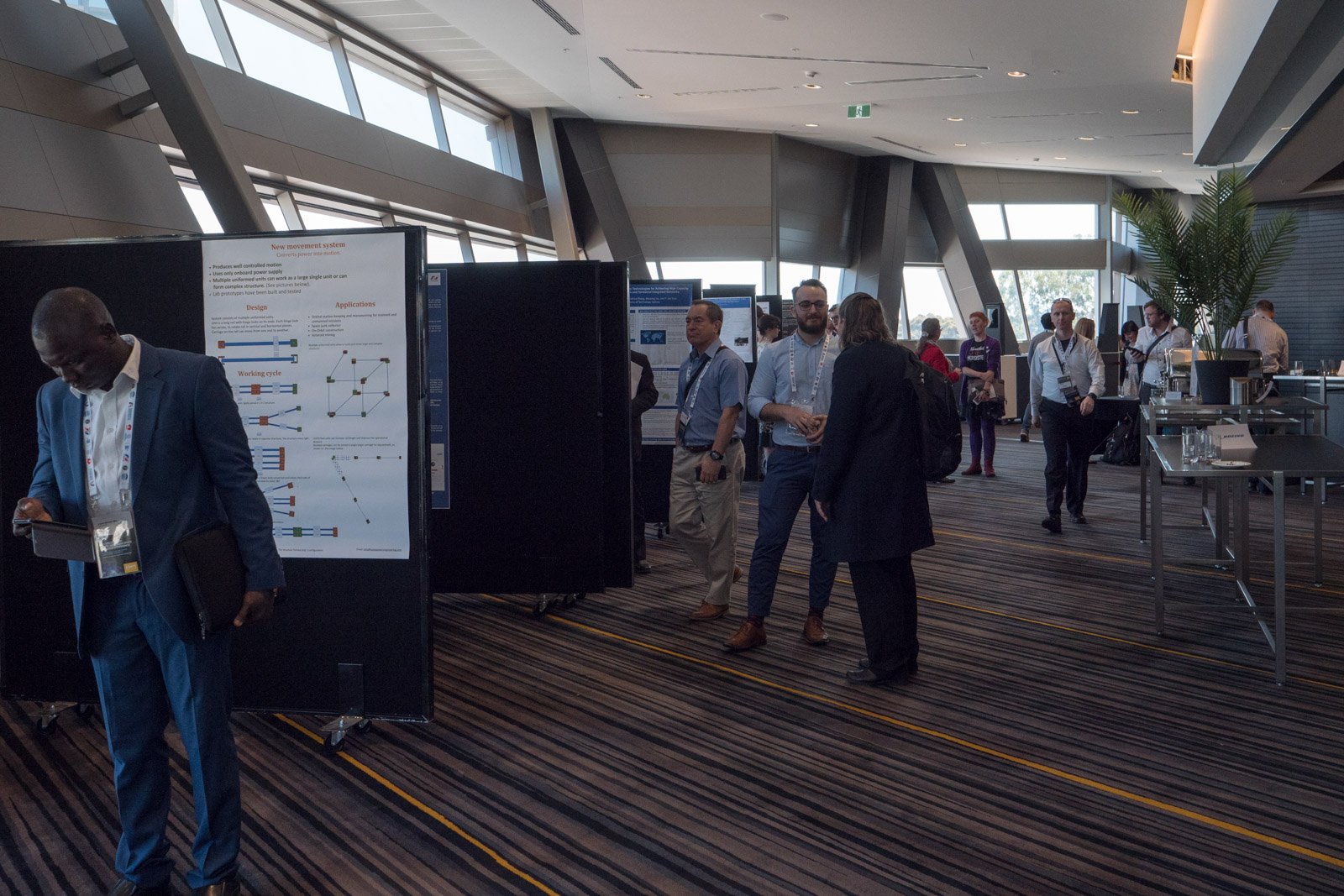
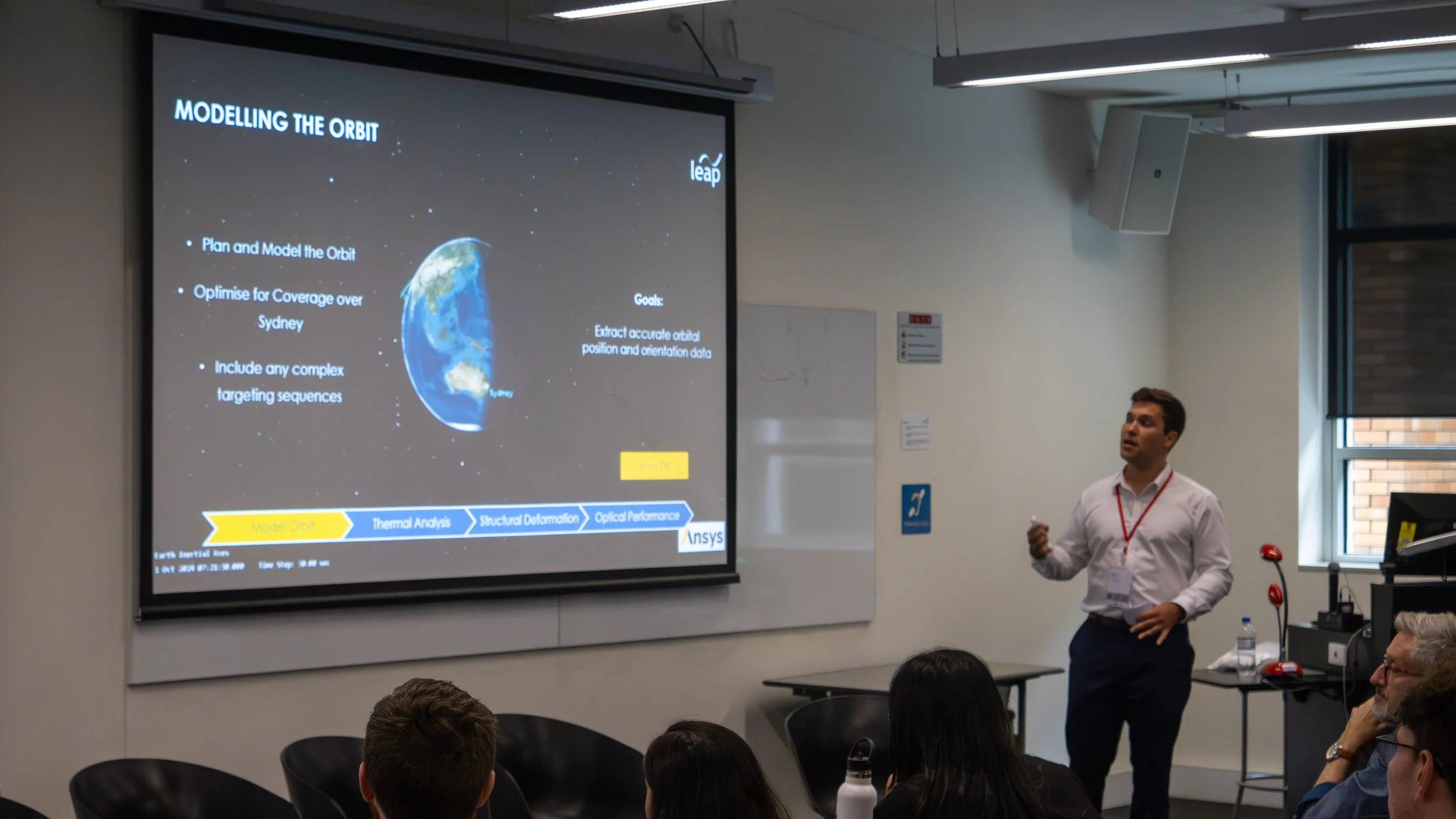
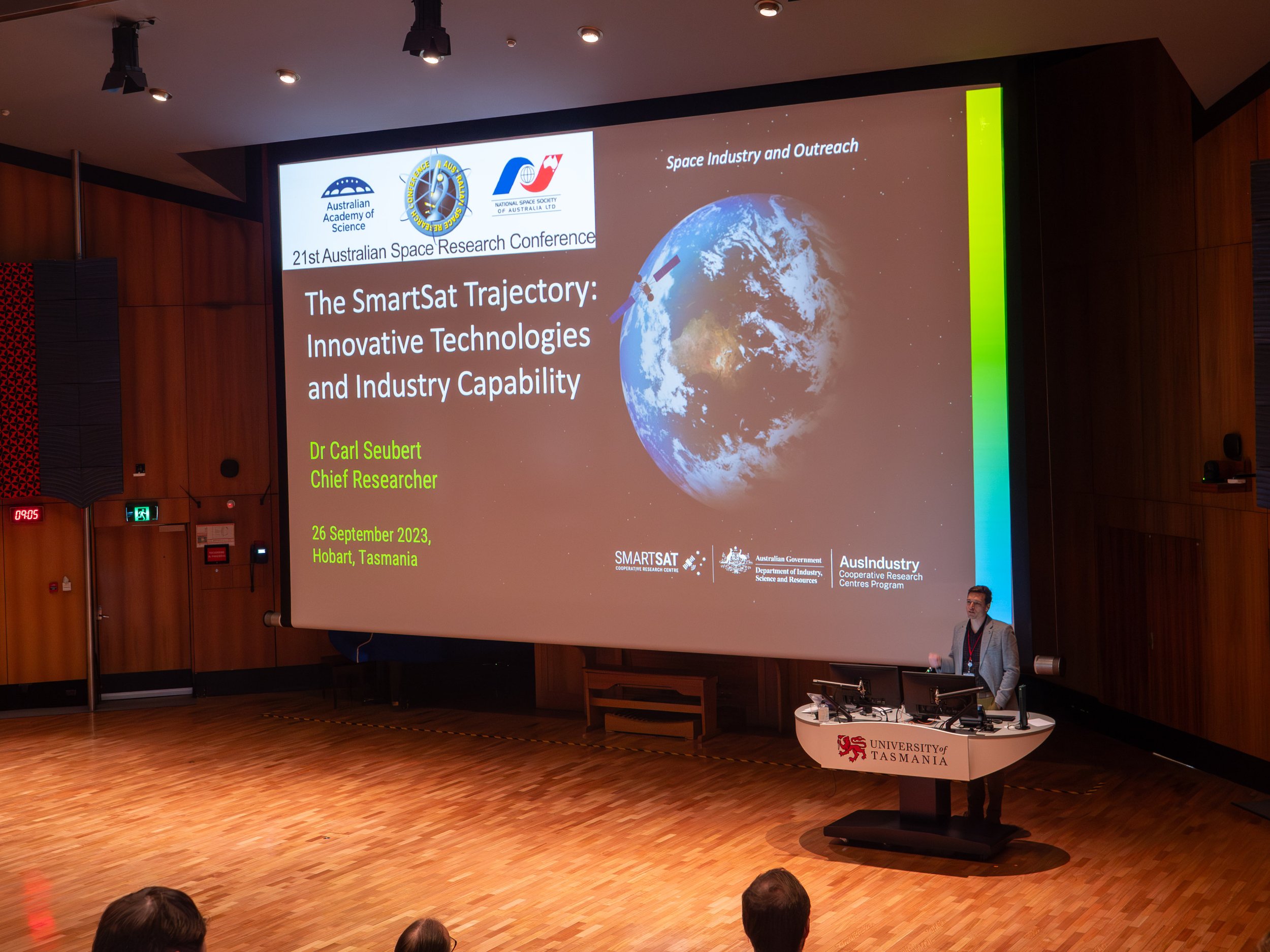
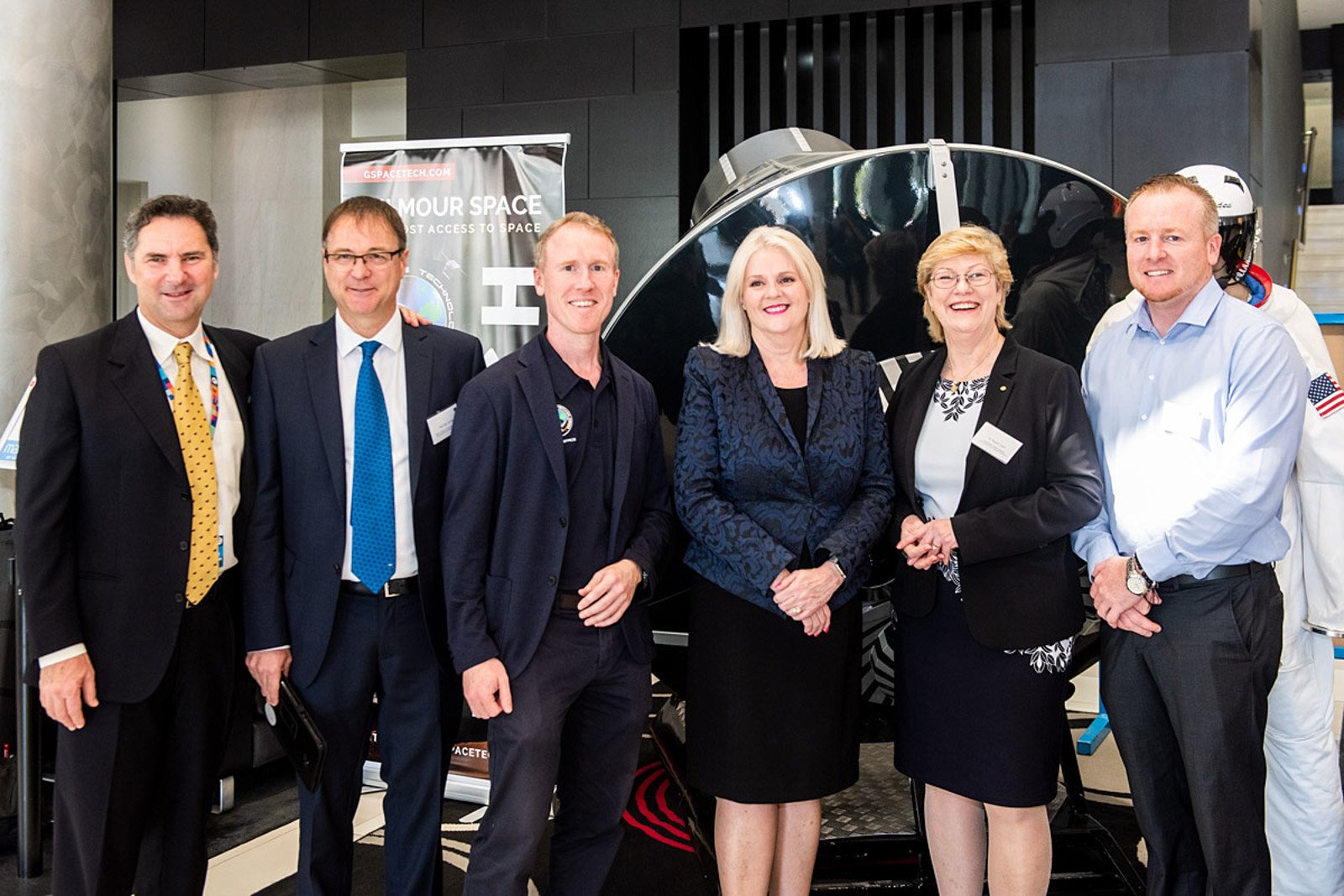
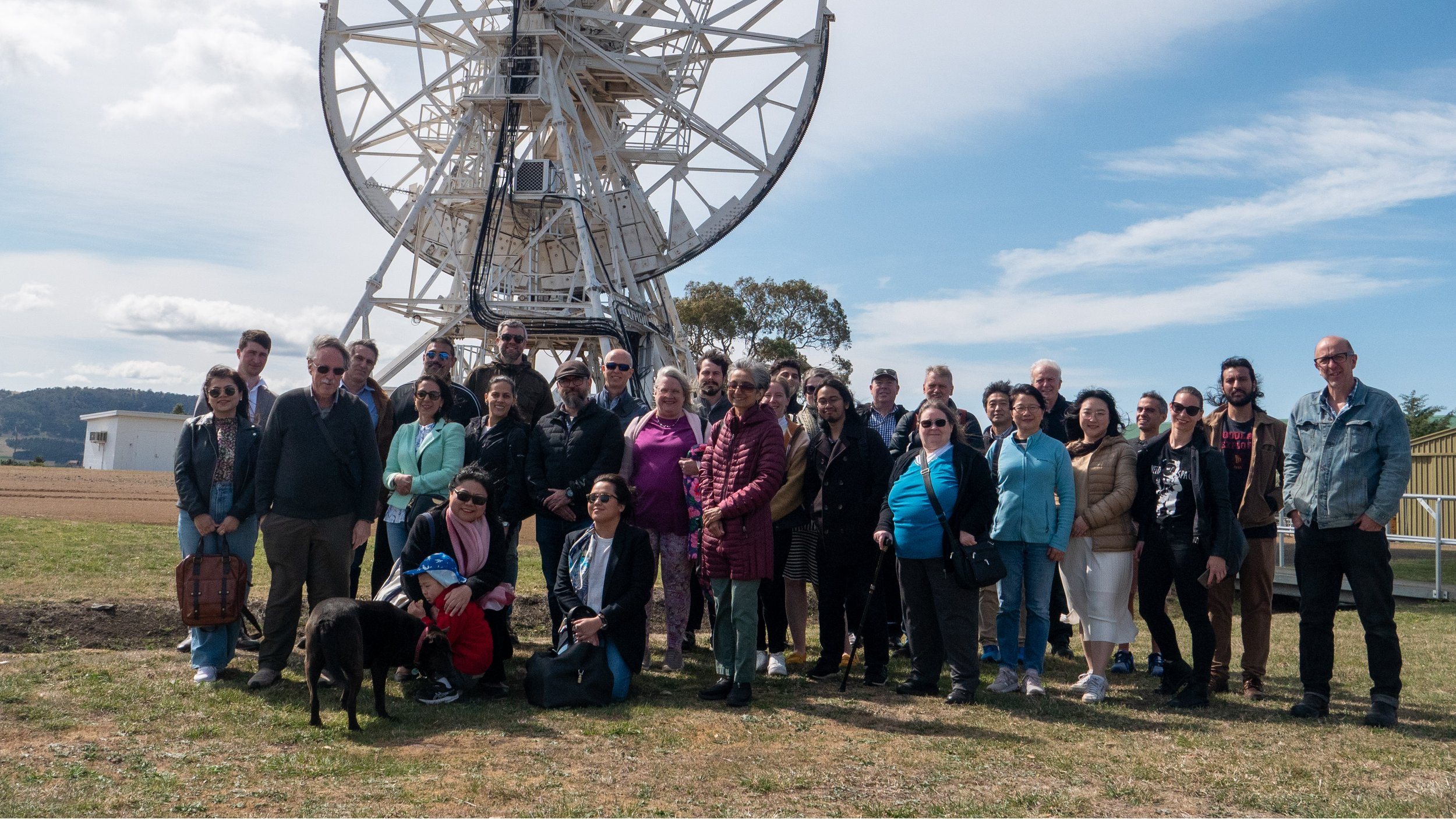

Conference Program
The draft conference program is now ready to review here.
Monday November 24
Tuesday November 25
Wednesday November 26.
Presentations
Oral Presentations: Plenary or Invited presentations are 30 minutes in length. Normal oral presentation are capped at 15 minutes. All presenters should allow time for Q&A with other delegates. 2 minutes for normal presenters and up to 5 minutes for plenary/invited presenters.
Upload your presentations here for secretariat.
Written Conference Papers
Poster Presentations: Posters may be maximum of A1 size in either landscape or portrait orientation. Poster presentation session will be on the afternoon of Monday November 24. The presenters should be prepared to setup up their poster on the posteboards will be providing in the lunch break. The poster authors during the dedicated poster sessions have the opportunity of discussing their research work with other delegates.
We are also accepting full papers to be included in the conference proceedings which will be published in mid 2026. (This is optional for delegates).
These will be peer reviewed. The submission deadline is now extended to Wednesday December 10, 2025. A sample format of the paper can be found here.
We are accepting papers for peer review now via EasyChair. They are attached to your original abstract submission. The details on how to upload them are here in this document..
Prize Marking
We are also marking students & ECR’s for possible prize through the conference. Those under consideration are here.
Those marking can access out form below.
Extra Conference Activities
Monday November 24:
Public talk by Dr Siddarth Pandey from FUGRO Australia . All welcome.
“A decade training and learnings in the Himalayas for Mars Society Australia" - A Vision for Australia-India Collaboration in Outer Space.
Full details of the presentation may be found here.
7:00pm - 8:00pm in Main Auditorium (room 213). Doors open at 6:30pm
Bookings by Eventbrite here.
Tuesday November 25:
Conference Dinner at Berth Restaurant located near at Docklands Quay.
Time: 6:30pm - 10:00pm. Meze served at 7:00 pm
Dress: Business Casual.
3 course meal set at $100 per person (drinks are extra).
More about the venue here. Views of the seating and the city skyline here from restaurant.
Fully booked. Contact secretariat to be placed onto a waiting list.
Directions to find the restaurant are here.
Current list of dinner guests is here.
Thursday November 27:
A private tour of the Victorian Space Science Education Centre (VSSEC) at Strathmore College is now available. Operates between 11am to 1pm. Limited numbers with a separate RSVP email to follow to delegates.
Attendees will need to get their own transport there but a railway station is within easy walking distance on the centre.
Fully booked. Attendees will be contacted around November 15 with further instructions on attendance.
WORKSHOP: Developing a White paper on Australia's Space Research and Development landscape – an initiative of the NSW Space Research Network
Are you interested in shaping the future of space R&D in Australia?
The NSW Space Research Network (SRN): www.srn.org.au is developing a White paper on space R&D, focusing on opportunities and challenges facing the Australian space research community in conducting, translating, and commercialising space R&D. The SRN is a university led initiative of the NSW Government, designed to enhance NSW space industry capability through collaboration with academic research institutions, industry and government.
The White paper is aiming to articulate the strategic importance and application of space R&D to influence policy-makers on the direction and investment priorities in this area.
Focus areas in the White Paper include:
Space communications and cybersecurity
Space situational awareness
Earth observation
Positioning, navigation and timing
Robotics
Space qualification and testing
Attending this interactive session will give you an opportunity to find out more about this initiative and contribute directly to its development. Join us for this interactive session: Tuesday 25 November, 1.30 – 3.00pm.
For further information contact Margaret Hudson: margaret.hudson@srn.org.au
Transport and Accommodation
The Melbourne CBD is close-by to the Monash University City Campus. It is located within 400 meters walk to Southern Cross railway station. General directions to the campus may be found here.
Suggested nearby accommodation options are may be found here.
The University campus has a tram stop nearby which falls in the Free CBD travel Zone.
A map showing the overall CBD tram network is available to download here.
Location
Monash University City Campus
750 Collins street
Docklands, VIC, 3008
Organising Committee
Cheryl Brown, Secretariat
Iver Cairns, Conference Co-Chair, University of Sydney
Rowena Christiansen, Mars Society Australia
Guifre’ Molera Calves, University of Tasmania
Jack Dwyer, National Space Society of Australia
Trevor Harris, University of Adelaide
Patrick Humbert, La Trobe University
Jonti Horner, University of Southern Queensland
Li Qiao, Chair - Program Committee, UNSW Canberra
Wayne Short, Conference Co-Chair, President, NSSA
Inquiries
General Inquiries:
asrcconference@nssa.com.au
phone: +61 411 296 541
Abstracts:
asrc-abstracts@nssa.com.au
Registrations:
asrcsecretariat@nssa.com.au



